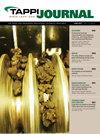外置干燥器石灰窑煅烧过程的动态CFD建模
IF 0.6
4区 农林科学
Q4 MATERIALS SCIENCE, PAPER & WOOD
引用次数: 0
摘要
窑中环的形成是石灰窑的一个问题,它可能与煅烧起始位置的波动有关。为了计算带有外部干燥器的石灰窑内床层温度和气体温度的波动曲线,在ANSYS Fluent中建立了含甲烷燃烧器的动态二维(2D)轴对称计算流体力学(CFD)气体模型,并将质量和热平衡耦合到一维(1D)床层模型中。利用纸浆厂数据,利用动态模型计算了煅烧起始位置随操作条件波动的变化。该模型模拟了气体、炉壁和炉床之间的辐射、对流和传导传热,以确定窑床轴向温度。煅烧反应是用一个收缩的核心模型来描述的,该模型可以预测煅烧开始的位置和达到的煅烧程度。窑内的固体运动采用瞬态响应修正的Kramer方程进行建模。稳态和动态模拟结果与工业干石灰窑的数据进行了比较,结果吻合较好。还进行了敏感性分析,以深入了解操作条件和模型变量如何影响煅烧位置和煅烧程度。在考察的变量中,燃料速率和进料温度对窑内煅烧位置和煅烧程度的影响最大。对工业窑中环形形成周期的模型预测表明,煅烧开始位置在正常运行平均值的两侧波动超过2米,需要进一步研究这些波动对窑中环形形成的重要性。本文章由计算机程序翻译,如有差异,请以英文原文为准。
Dynamic CFD modeling of calcination in a rotary lime kiln with an external dryer
Mid-kiln ring formation is a problem in lime kilns that may be related to fluctuations in the start location of calcination. To calculate fluctuations in bed and gas temperature profiles within a lime kiln with an external dryer, a dynamic two-dimensional (2D) axisymmetric computational fluid dynamics (CFD) gas model with a methane burner implemented in ANSYS Fluent, coupled by mass and heat balances to a one-dimensional (1D) bed model, was developed. The dynamic model was used to calculate changes in the location where calcination starts with fluctuations in operational conditions using pulp mill data.
This model simulates radiative, convective, and conductive heat transfer between the gas, wall, and bed to determine the axial bed temperature in the kiln. The calcination reaction is described using a shrinking core model that allows for the prediction of the location at which calcination begins and the degree of calcination achieved. The solid motion within the kiln is modeled using Kramer’s equation modified for transient response.
Steady-state and dynamic simulation results were compared to data from an industrial dry lime kiln, and good agreement was found. A sensitivity analysis was also performed to provide insight on how operating conditions and model variables impact the calcination location and degree of calcination. Of the variables examined, the fuel rate and the feed temperature had the largest impact on both the calcination location and degree of calcination in the kiln. Model predictions of a period of ring formation in the industrial kiln showed that the start location of calcination fluctuated by more than 2 m on either side of the mean of regular operation, warranting further investigation of the importance of these fluctuations on mid-kiln ring formation.
求助全文
通过发布文献求助,成功后即可免费获取论文全文。
去求助
来源期刊

Tappi Journal
工程技术-材料科学:纸与木材
CiteScore
1.30
自引率
16.70%
发文量
59
审稿时长
6-12 weeks
期刊介绍:
An internationally recognized technical publication for over 60 years, TAPPI Journal (TJ) publishes the latest and most relevant research on the forest products and related industries. A stringent peer-review process and distinguished editorial board of academic and industry experts set TAPPI Journal apart as a reliable source for impactful basic and applied research and technical reviews.
Available at no charge to TAPPI members, each issue of TAPPI Journal features research in pulp, paper, packaging, tissue, nonwovens, converting, bioenergy, nanotechnology or other innovative cellulosic-based products and technologies. Publishing in TAPPI Journal delivers your research to a global audience of colleagues, peers and employers.
 求助内容:
求助内容: 应助结果提醒方式:
应助结果提醒方式:


